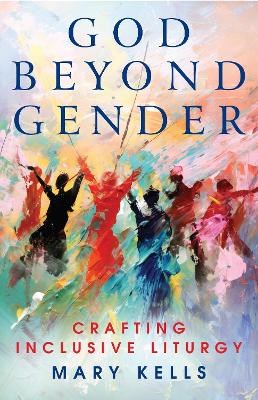by Rosalind Rutherford, Inclusive Church Trustee

Yesterday I came across a clip of a schoolgirl watching Ellie on Strictly Come Dancing, and she was laughing, smiling, dancing clapping and jumping for joy. “She is like me!” was what she repeated over and over again, almost unable to contain her joy. At the heart of her joy was recognising herself in another and being affirmed though Ellie’s dancing.
I thought back a week, when I was in Canterbury cathedral for Evensong before the launch of the book God Beyond Gender. Centuries of worship had taken place here, and until a few decades ago, entirely led by men and boys. This evening the longest bible reading was read by a woman, the top line of the choir was all girls and above us all was the empty chair of St Augustine where, in about five months, a woman will sit. The evensong canticle we all remember is the Magnificat, Mary’s song of joy. But despite this, the language we were using for God was all male. How can women, or indeed anyone, who is not an able-bodied, cis male feel fully recognised and affirmed in our worship, which relies so much on words?
This is the challenge that Mary Kells describes and then faces in “God Beyond Gender”. Mary is a member and Trustee of WATCH (Women and the Church) and so she comes to this challenge as a woman who, despite having helped to lead televised services at King’s College in Cambridge, still feels marginalised by the language of most Christian worship. This book began as an idea for a leaflet to help anyone planning worship, particularly in the Church of England, bring much more inclusive language and images without breaking the rules around Anglican worship.
The book is written, in the first instance, thinking of those who prepare and lead worship, with introductory chapters considering the background to our thinking about gender and sex, and how our reading of the bible and our theology speak into the questions this might raise. Mary then moves on to a more personal chapter, explaining why using as much richness in how she addresses and speaks of God, particularly in worship, matters so much. She describes how when she broke the unspoken taboo challenging male language she felt “broken open. Into this raw, tender opening I found myself filled – with emotion, gratitude, recognition, with the Holy Spirt”. This, and similar responses from women and others, encountering liturgy that does not exclude them, is what Inspires (sic) Mary to continue crafting such liturgies.
The book includes guidance on how to plan worship that is inclusive. What questions should and could we be asking? Who is the worship for? What is the purpose of the act of worship?
However, Mary is also realistic that in the context of a local church, any leader of worship needs to be aware that change may be resisted. How can those who are uncertain about using different language be included themselves? She also considers the range of images for God, including the huge range of images in the bible, and discusses the question of which pronouns to use -and why we might make different decisions at different times. However, sometimes it is fear of doing something wrong that limits our creative exploration of worship, and so for Church of England clergy there is an appendix that many will find very helpful, as it explains clearly how inclusive texts which expand our understanding of God, a can be incorporated into services while still keeping Canon Law.
All readers of this book, lay and ordained, will find much to inspire and use in the examples of liturgies Mary has written and used.
The prayers and responses are beautiful, written with poetic images and rhythm, and I am sure everyone will find at least one prayer they can use or even modify themselves for their own context.
At the launch, several people suggested that studying the book in a in a parish group might well be both interesting for all and also lay the foundations for introducing more inclusive liturgy into their services. Helen King, who was interviewing Mary for the launch, spoke of God Beyond Gender as an empowering book that stimulates conversation and thinking, offering examples to discuss and be inspired by.
As I write this, I am feeling the heaviness of the way the Church of England excludes so many people in so many ways. So to encourage myself and, I hope, others, I end with a short section of a prayer written on the theme of hope:
God among us. Help us to be life-livers
And hope bringers.
Show us how to dare
To live our glorious freedom,
Break the shackles of our smallness
And liberate us
That we may be liberators of others.
God Beyond Gender: Crafting Inclusive Liturgy by Mary Kells is available from Canterbury Press for £12.99 and is available here.
